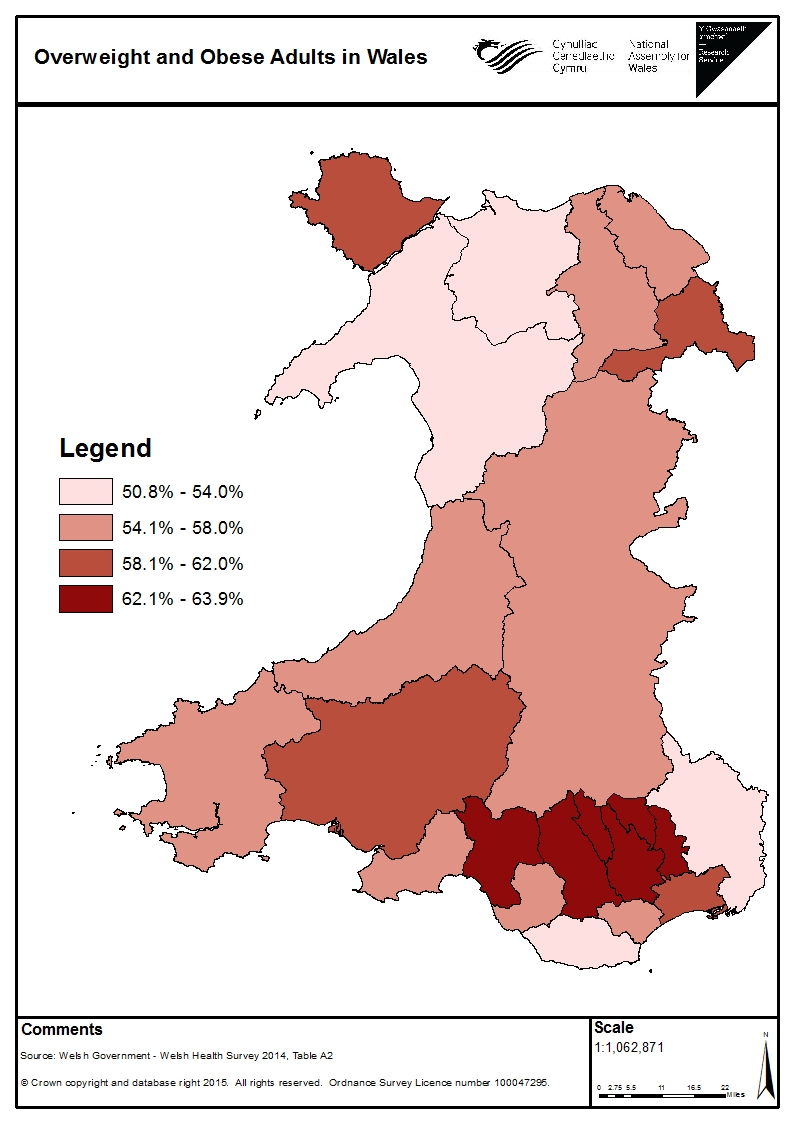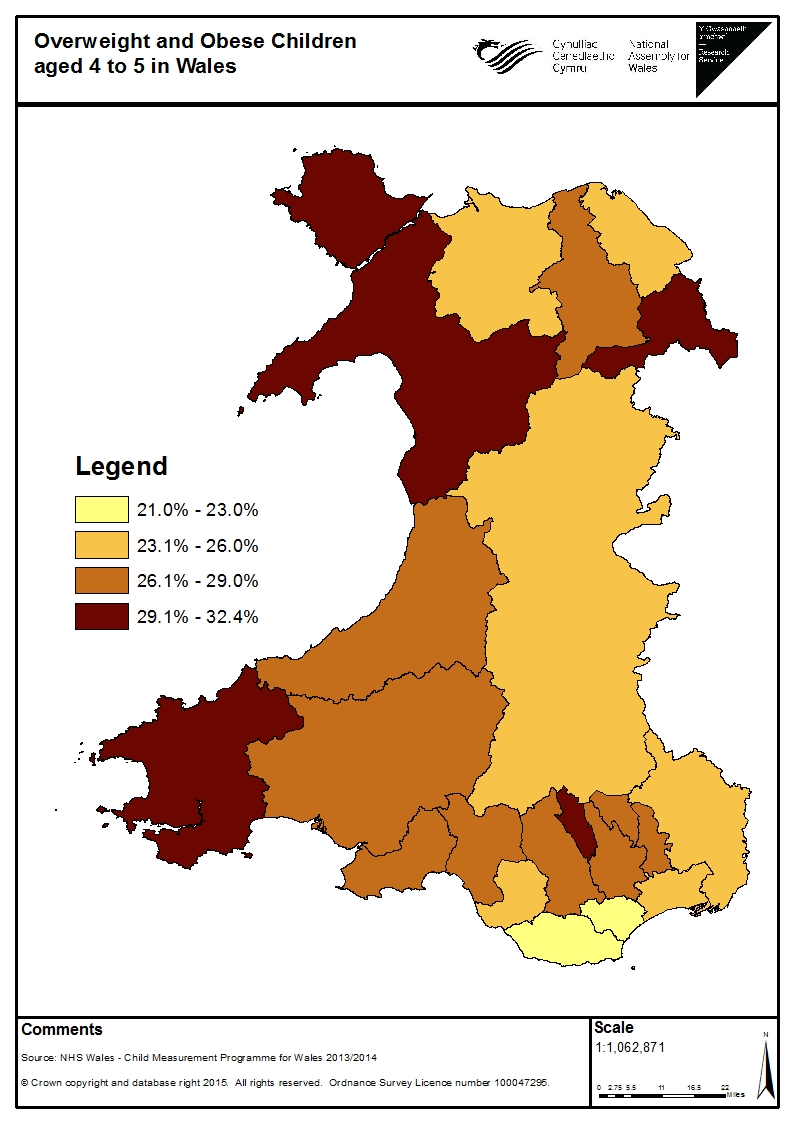Article by Megan Jones and David Millett, National Assembly for Wales Research Service
This week (11-17 January) is National Obesity Awareness Week, the perfect opportunity to take a look at obesity levels in Wales, and what action is being taken to tackle the issue. Adult obesity According to the most recent statistics from the Welsh Health Survey 2014, 58 per cent of adults in Wales are classified as being overweight or obese. This is an increase from the 54 per cent of adults who were overweight or obese when the survey was first published in 2003/04. The prevalence of overweight and obese adults rises with increasing deprivation, from 53 per cent in the least deprived fifth to 61 per cent in the most deprived fifth.

Childhood obesity Findings from Public Health Wales’ Child Measurement Programme show that in Wales 27.3 per cent of children were classified as being overweight or obese. The prevalence of overweight or obese children in Wales aged 4-5 in reception year at school (26 per cent) was higher than that in England (23 per cent) and higher than any individual English region, where the highest prevalence was 24 per cent. The prevalence of overweight and obese children rises with increasing deprivation, from 22.2 per cent in the least deprived areas to 28.5 per cent in the most deprived areas of Wales. 
Welsh Government action In 2010, the Welsh Government published the All Wales Obesity Pathway, which sets out the actions that should be taken by Local Health Boards, working jointly with Local Authorities and other stakeholders, to help tackle the issue of obesity in Wales through local policies, services and activities for children and adults. The Pathway sets out a four tier framework for obesity services: Level 1: Community based prevention and early intervention (self-care). Level 2: Community and primary care weight management services. Level 3: Specialist multi-disciplinary team weight management services. Level 4: Specialist medical and surgical services. A review of progress against the pathway, published in August 2014, found that all health boards across Wales were providing level one and two services, but the provision of level 3 services remained inconsistent and Welsh Government acknowledged that more needed to be done. Inquiry into the Availability of Bariatric Services In May 2014, the National Assembly for Wales’ Health and Social Care Committee published the findings of an inquiry into the Availability of Bariatric Services, focusing on the availability of specialist Level 3 and 4 services. The Committee found that the delivery of these services varied across Wales with only one out of seven Health Boards providing a comprehensive specialist weight management service (Level 3). The Committee also found that individuals seeking to access surgical provision (Level 4) have been subject to more stringent eligibility criteria than recommended by National Institute for Health and Care Excellence guidelines. The report made a number of recommendations, including:
- the Welsh Government should work with Local Health Boards to provide a clear outline of the actions that will be taken to implement the All Wales Obesity Pathway fully, and provide details of the associated timescales.
- the Welsh Government should provide assurances that it will require forthcoming Local Health Board plans and the all-Wales Level 3 service specification to include measures to address the lack of multi-disciplinary service provision in Wales within the next 12 months.
- the Welsh Government should develop and publish a monitoring and evaluation framework for bariatric services in Wales
Inquiry into Childhood Obesity The conclusions of the Children, Young People and Education Committee’s Inquiry into Childhood Obesity were published in March 2014. The aim of the inquiry was to consider the effectiveness of Welsh Government policies, programmes and schemes aimed at reducing the level of childhood obesity in Wales, and to identify areas where further action is needed. The Committee’s report made a number of recommendations, including:
- the Welsh Government should review the progress of Local Health Boards in meeting minimum service requirements for each level of the All Wales Obesity Pathway.
- the Welsh Government should ensure that level 3 services for children are put in place across Wales.
- the Welsh Government should develop and publish an evaluation framework for its strategies relating to childhood obesity to ensure that the performance of strategies can be monitored against outcomes.
Welsh Government response In its written response to the report, the Welsh Government accepted the majority of the Committee’s recommendations, and reported on the progress made towards achieving those recommendations. This progress included:
- changes to the assessment process for the All Wales Obesity Pathway.
- the development of a draft National Obesity Level Three Service Specification and Clinical Access Policy for adults by Public Health Wales, and a commitment to the development of a similar draft policy for children.
- the Welsh Government asking Public Health Wales to develop an evaluation framework for strategies relating to childhood obesity as part of its 2014/15 work plan.
Turning the Curve on Childhood Obesity In February 2015, the Preventing Childhood Obesity Steering Group published their report, Turning the Curve on Childhood Obesity in Wales. The Steering Group had been commissioned by the Effective Services for Vulnerable Groups work programme, one of four national programmes of work led by the Public Service Leadership Group, to explore cross-public service solutions to the problem of childhood obesity. The report’s focus was to identify practical steps which public services in Wales can take to prevent an upward trend in the levels of childhood obesity. The Steering Group identified six key themes or ‘changes we want to see’:
- More children able to walk or cycle to and from school.
- Safe environments where children can play in the evenings, weekends and holidays.
- More children participating in sport and becoming hooked on sport for life.
- All children able to access healthy, nutritionally-balanced meals on a daily basis.
- Children and parents are able to distinguish between healthier and less healthy foods, feel confident in trying and preparing healthier foods, and are able to make informed dietary choices.
- Healthier choices are easier to access than unhealthy choices.
Additional information The National Obesity Forum’s State of the Nation’s Waistline report 2015.




